Bangladesh's foremost oppositional intellectual
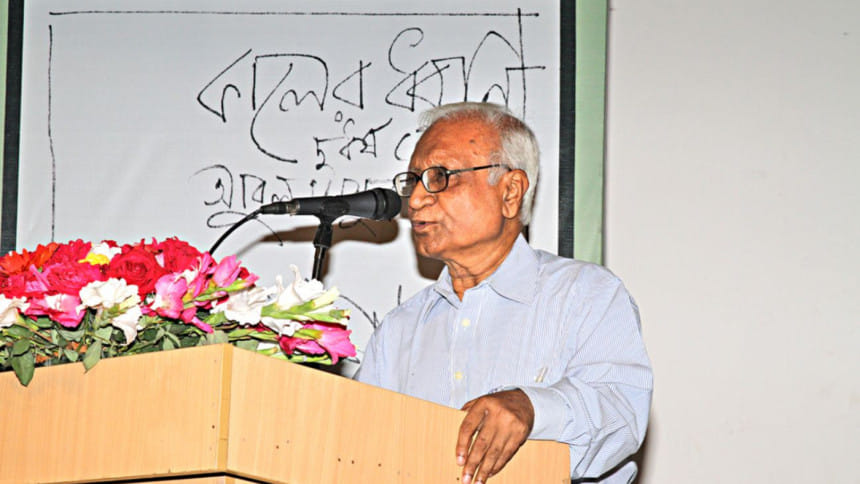
Today - June 23 - marks the 80th birthday of Serajul Islam Choudhury. He was my teacher in the English Department of Dhaka University. True, I first saw him from a distance, and then in our own classroom where his brilliant and eloquent lectures on Tolstoy and on quite a constellation of novelists from Austen to Dickens, to Forster to Lawrence seemed to us nothing short of 'epic' events. We wondered how one could speak so unfalteringly yet so substantially, as he surely did. His lectures were exemplary of simplicity, depth, and beauty. I myself have studied and taught English here and in the US, and I can't resist saying that I've hardly come across any professor as eloquent as he is. But, of course, Choudhury is more than his eloquence; his work is more than his classroom lectures.
A literary and cultural critic, social and political analyst, historian, educationist, editor, translator, columnist, activist, and even organiser, Serajul Islam Choudhury has been writing productively and tirelessly for more than five decades now. He is the author of nearly a hundred books and countless essays in Bangla, while he has also written a number of books in English. By now his published works have been only incompletely collected in eight volumes. Indeed, Choudhury's range of preoccupations has hitherto been simply staggering. Thus, when it comes to evaluating him, one can by no means do justice to the magnitude of his oeuvre in a short piece like this one. But I intend to touch on only a few aspects of his work.
I think Choudhury's primary identity is that of an intellectual. He is our foremost oppositional intellectual in Bangladesh, one whose words and works continue to speak to the emancipatory struggles of the oppressed around country and the world. Indeed, some exemplary intellectuals themselves have written about the roles of intellectuals - the Italian Marxist Antonio Gramsci, the American linguist and political analyst Noam Chomsky, and the Arab-American cultural theorist Edward Said, for instance. It is in this tradition, it seems, that our own Serajul Islam Choudhury has also considerably written about the responsibilities of intellectuals, particularly in his thought-inspiring and stylistically coruscating Buddhijeebider Kajkormo o Daaydaayitto. Of course, all of them, their different approaches notwithstanding, distinguish a committed, engaged, and oppositional intellectual from his or her "traditional" counterpart.
For Choudhury, then, an intellectual is one who questions not only received wisdom but also the dominant, oppressive system. But the intellectual - as Choudhury tells us in the vein of Marx's eleventh thesis on Feuerbach - does not merely question the system as such, but also wants to change it. It is then in the interest of change that, as Choudhury further maintains, the intellectual tries to reach others - the people - with his questions, inquiries, thoughts, ideas, and so on. For Choudhury, the intellectual is in total solidarity with the cause and struggles of the oppressed. The intellectual may not directly represent the oppressed as such, but he or she works for and with them. As Paulo Freire rightly puts it, "This person does not consider himself or herself the proprietor of history or of all people, or the liberator of the oppressed; but he or she does commit himself or herself, within history, to fight at their side."
Indeed, what Freire says above, and what Serajul Islam Choudhury himself says about intellectuals in his own work, can easily be applied to Choudhury himself - one of the foremost intellectuals of our times, committed as he is to nothing short of the total emancipation of his own country's people, the majority of whom are peasants and workers. Their aspirations and struggles abidingly remain at the forefront of most of his work. It is here where Choudhury's Marxism and humanism effortlessly come together. He remains not only a partisan of the cause of justice for the oppressed, but also a transformative figure at the front line of emancipatory knowledge and action in Bangladesh.
Organically rooted as he is in his own country - one who has decisively chosen to write in Bangla, evolving a unique prose style that makes his work infinitely readable - Serajul Islam Choudhury remains acutely responsive to and thoroughly informed by liberation struggles, class struggles, and other forms of struggle in his own homeland. Choudhury in his capacity as a critic and an intellectual has long been questioning the political, literary, and cultural establishment all at once in Bangladesh from the perspectives of the emancipation of the people. The category "people" for him is no mere abstraction, though. Abandoning - and remaining fiercely critical of - the liberal rhetoric of Western humanism that erases the questions of class, gender, race, and nation in the name of the love of the people, Choudhury clearly identifies the people he has been writing and fighting for, as he also identifies the very systems that oppress them, unlike many of his counterparts and contemporaries in Bangladesh, ones who use euphemisms and other discursive detours to obscure or ignore both the people and the systems of oppression at work.
For Choudhury, then, the people are the toiling masses themselves - peasants and workers - including women as well as ethnic, linguistic, and religious minorities. And the systems of oppression Choudhury has long been writing about and combating include capitalism, imperialism, colonialism, and patriarchy, profoundly interconnected as they are. Indeed, Choudhury is our major anti-capitalist, anti-imperialist, anti-colonial, and anti-patriarchal writer-activist. His work does not, however, remain confined to opposition only, but he openly and ardently advocates the cause of socialism, while remaining faithful to the three fundamental principles of our Liberation War of 1971 - equality, social justice and human dignity. Choudhury's thematic preoccupations in a range of works from his earlier Nirasroy Grihee (1977) to Swadhinota Spriha Sammyer Bhoy (1988) to Pittritantrikotar Bipokkhe (2007) to Bicchinnotay Osommoti (2014) all amply attest to the points I have made above. Exploding media-circulated stereotypes and misconceptions surrounding socialism, Choudhury unequivocally asserts that genuine democracy (not mere electoral or bourgeois democracy) and socialism are by no means mutually exclusive, or antagonistic to one another. To be socialist is to be democratic and vice versa, as Choudhury firmly believes.
Now a few words about Choudhury as a literary-cultural critic. Serajul Islam Choudhury has almost single-handedly inaugurated a school of socially and politically engaged literary and cultural criticism in Bangladesh. He has written about every major, canonical figure in Bangla literature, identifying their particular contributions, without, however, letting them off the hook. And he has done all this from the perspectives of the people's emancipation, particularly in a star-struck culture of the uncritical, even blind celebration of literary and cultural giants. His oppositional, politically engaged critical readings of Raja Ram Mohan Roy, Ishwar Chandra Vidyasagar, Madhusudan Dutta, Bankim Chandra Chattopadhyay, even Rabindranath Tagore, and Sarat Chandra Chattopadhyay are only a few compelling cases in point. For Choudhury, however, the exemplary revolutionary figure in literature is Kazi Nazrul Islam on whom, of course, Choudhury has written commendably and profusely. Choudhury is also the first one to have questioned the ideology of the modernism of the thirties - particularly that of Buddhadeva Bose. Also, at a time when English professors were busy adoring such canonical Irish-Anglo-American modernists as Yeats, Pound, Eliot, Lawrence, and Joyce, it is Choudhury in Bangladesh who first provided devastating critiques of those figures in his groundbreaking work called Protikriyashilota Ingreji Shahittye, while of course acknowledging their strengths and contributions. Indeed, one can go on talking about many things he did first in the country, while it is true that we have not yet been able to evaluate Choudhury's work properly and thoroughly.
On a relatively personal note: I had the honour and privilege of working and seeing my teacher Serajul Islam Choudhury closely for several years, as we collaboratively edited the national views weekly called Somoy back in the nineties, and I learned from him way more than he knows. On his eightieth birthday, I wish him more productivity and more youthfulness in the interest of our struggles against all forms and forces of oppression and injustice.
The writer is Vice-President of US-based Global Center for Advanced Studies and Associate Professor of Liberal Studies/Interdisciplinary Studies at Grand Valley State University in Michigan, while he is currently Scholar-in-Residence at the University of Liberal Arts-Bangladesh (ULAB).

 For all latest news, follow The Daily Star's Google News channel.
For all latest news, follow The Daily Star's Google News channel. 

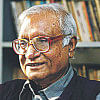
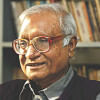
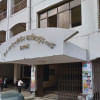

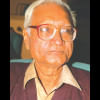


Comments